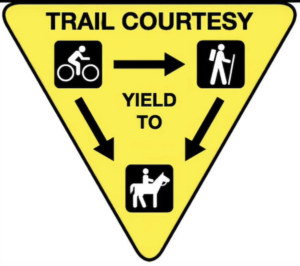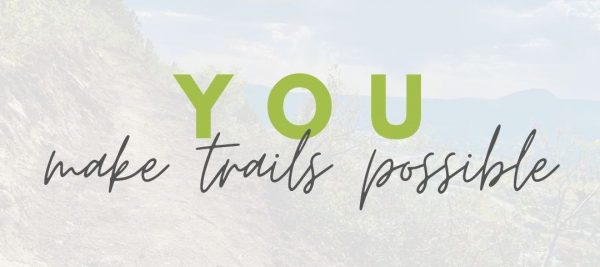At Durango Trails, Share the Trail ethics are important to us and our efforts to keep trail experiences positive. That’s why, in 2014, we launched our Durango Shares the Trail campaign, an educational campaign which recognizes an attitude of positive interaction and trail stewardship on the trail. To keep a positive experience for all users, we all need to do our part!
When on the trail, it is extremely important to observe the rules of the trail and mind your trail manners, making sure to be kind, respectful, and share the trail with other users.
The following are simple guidelines to ensure proper sharing of the trail:
Trail Etiquette: The Basic Rules of the Trail
- Stay on the trail.
- If the trails are wet or muddy, it’s not the day to hike or ride. Check our Trail Conditions Report to double check conditions before heading out.
- If another trail user approaches you, say hello, especially if they say hi first. Remember that trails connect us to one another!
- Mountain bikers trudge and toil to get uphill; please let them through to do so.
- When other trail users try to pass you, let them. In general, other trail users should say “on your left” as they pass so you can move to the right out of their way. (If trying to pass someone yourself, make sure to announce yourself as well!)
- When approaching a horse on the trail, be sure to: announce yourself so the rider and horse both hear you; be clearly visible; pull off to the lowside of the trail to allow them to pass; and say hi!
- Please keep your dog on a leash or under voice control.
- Give back to the trails you love by volunteering and donating to Durango Trails.
Click here to view a clip from Inside Durango TV News explaining the simple idea of sharing the trails, as well as the rules of the trail, from Executive Director Mary Monroe Brown.
Trail Rules 101
1. Ride On Open Trails Only
Respect trail and road closures (ask if uncertain), avoid trespassing on private land, and obtain permits or other authorization as may be required. Federal and state wilderness areas are closed to cycling. Respect seasonal wildlife closures; learn more in our It’s Up To Me video below. The way you ride will influence trail management decisions and policies.
2. Leave No Trace
Be sensitive to the dirt beneath you. Recognize different types of soils and trail construction and practice low-impact cycling. Wet and muddy trails are more vulnerable to damage. When the trailbed is soft, consider other riding options. This also means staying on existing trails and not creating new ones. Don’t cut switchbacks. Be sure to pack out at least as much as you pack in.
According to Backpacker Magazine, Leave No Trace (LNT) (www.lnt.org) has seven principles promoting ethical, low-impact outdoor recreation. It’s easy to practice LNT’s major rules: Carry out trash, keep away from wildlife, and minimize the impact of campfires. The finer points, however—like packing out toilet paper and building small fires—are harder to follow. Here are Prof. Hike’s six tips to make the tough tenets of LNT more achievable:
- 200 feet equals 40 adult strides.
- Use the rubber tip of a spatula to scrap leftover food from plates and bowls into your mouth.
- Reduce odors by placing silica gel desiccates (those moisture-absorbing packets found in shoe boxes and other packages) into your trash bag, then double-bagging it.
- Use dryer lint as natural fire tinder.
- Carry versatile sanitary wipes instead of flimsy toilet paper.
- Stop washing dishes, as veteran hiker Johnny Molloy advocates in this June 2007 Backpacker article.
For more information, check out the Colorado Tourism Office’s Care for Colorado partnership with Leave No Trace, which outlines how all residents and visitors can care for Colorado’s trails and forests.
3. Control
Inattention for even a second can cause problems. Obey all regulations and recommendations.
4. Always Yield Appropriately
Let your fellow trail users know you’re coming. A friendly greeting or bell is considerate and works well, don’t startle others. Show your respect when passing other trail users by slowing to a walking pace or stopping. Anticipate other trail users around corners or in blind spots. Yielding means slowing down, establishing communication, being prepared to stop if necessary and passing safely. If someone is coming uphill, please yield. Remember that bikes yield to hikers and horseback riders, and hikers yield to horseback riders.
5. Never Scare Animals
All animals are startled by an unannounced approach, a sudden movement, or a loud noise. This can be dangerous for you, others, and the animals. Give animals extra room and time to adjust to you. When passing horses use special care and follow directions from the horseback riders (see above, or ask if uncertain). Leave gates as you found them, or as marked.
6. Plan Ahead
Know your equipment, your ability, and the area in which you are riding or hiking — and prepare accordingly. Be self-sufficient at all times, keep your equipment in good repair, and carry necessary supplies for changes in weather or other conditions. A well-executed trip is a satisfaction to you and not a burden to others. Always wear a helmet and appropriate safety gear.
By following these simple steps on the trail, we can help keep trails open by setting a good example of environmentally sound and socially responsible trail use. Let’s continue to treat one another with respect, enjoy the company of others on the trail (we are all out there to enjoy them!), and Share the Trails!



